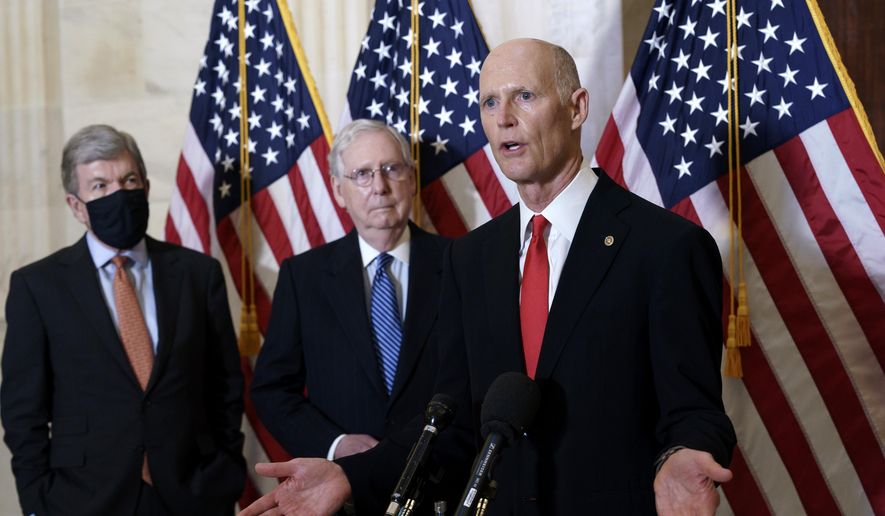Sen. Rick Scott has launched a bid for GOP leader to replace Sen. Mitch McConnell as the chamber’s top Republican, a long-shot endeavor that comes as the party seethes over its failure to retake the Senate majority in the midterm elections.
Mr. Scott, Florida Republican, announced to his Senate GOP colleagues Tuesday during an intense closed-door luncheon meeting in the U.S. Capitol. It lasted for hours as Mr. Scott and Mr. McConnell lobbed criticisms back and forth, said senators who witnessed the showdown.
A small but vocal number of Republicans demanded that change is warranted in the conference, whether it’s a willingness to bring more rank-and-file members into the fold on important issues or to elect new leaders entirely.
Mr. Scott, who chairs Senate Republicans’ campaign arm, has blamed the midterm losses on Mr. McConnell “caving” to Democrats on bipartisan legislation that gave the rival party and President Biden wins to tout on the campaign trail. He’s also accused Mr. McConnell of failing to set an election-year agenda on which Republicans could run.
“I’m not satisfied with the status quo, and so I think we ought to have an option,’’ Mr. Scott told reporters.
Mr. McConnell insisted he has the votes, despite the frustration in the ranks.
“The outcome is pretty clear. I want to repeat again: I have the votes to be elected,” the Kentucky Republican said after the luncheon.
Mr. Scott’s challenge is viewed more as a protest vote than a formidable threat to Mr. McConnell, who has led Senate Republicans for 16 years.
As the leader of the National Republican Senatorial Committee, Mr. Scott has been unable to escape some blame for the losses that kept Republicans in the Senate minority.
“If you’re going to assess blame for election losses, I don’t know how you trade in the leader for the chairman of the NRSC,” said Sen. Kevin Cramer, North Dakota Republican. “I just think it’s unlikely.”
Mr. McConnell rejected the notion by Mr. Scott that he failed to give his members an agenda, suggesting that the quality of Trump-backed candidates was primarily to blame.
“It’s pretty obvious … what happened,” Mr. McConnell said. “We underperformed among independents and moderates because their impression of many of the people in our party and leadership roles is they’re dull, chaos, negativity, excessive attacks, and it frightened independent and moderate Republican voters. We saw that, which is why I never predicted a red wave.”
SEE ALSO: Manchin quickly becomes Republicans’ next target with first 2024 challenge
Still, there is an outspoken group of Republicans who have questioned Mr. McConnell’s leadership and plan to vote against him such as Sens. Josh Hawley of Missouri and Mike Braun of Indiana.
Mr. Hawley said the midterms were evidence that there is “a systemic issue” with GOP leadership.
“If we don’t change, what do you tell voters? We’re going to keep doing the same thing, vote for us? That’s crazy,” Mr. Hawley said.
A faction of Republican senators demanded the postponement of leadership elections set for Wednesday morning, arguing the conference should wait until after the results of the Georgia Senate runoff next month.
“It’s ridiculous for Republicans immediately after a disappointing election result to just turn around and rubber stamp the same leadership we had without even having a conversation,” said Sen. Ted Cruz of Texas.
Senate Democrats, meanwhile, seized on the intra-party squabbling. Senate Majority Leader Charles E. Schumer warned Republicans against electing Mr. Scott.
“To follow the administrations of Rick Scott — the guy who said cut Medicare, the guy who said tax the middle class — would be suicidal for the Republicans,” the New York Democrat told reporters. “I hope that they, for the good of the country, but also for the good of themselves because we want a party of people we can work with, will understand that.”
Mr. Scott offered an agenda for Republicans before the midterms that included a sunsetting of all major spending, including Medicare and Social Security, thereby requiring Congress to reauthorize those popular programs. Mr. Scott said those programs are headed for insolvency and to save them, Congress needs to be forced to act.
Democrats campaigned heavily in opposition to the Scott plan, saying that he wanted to cut the popular entitlement programs.
Mr. Braun, who said he will support Mr. Scott for GOP leader, levied criticism against the current leadership for failing to give members enough input on policy issues.
“I want a different way that we roll as Republicans on the key issues. We very seldom get involved in any significant policy consideration. We play defense against Democrats,” he said. “I’m going to support whatever’s going to change in terms of dynamics, which for me is not as much about the leader as the leadership technique.”
• Ramsey Touchberry can be reached at rtouchberry@washingtontimes.com.




Please read our comment policy before commenting.